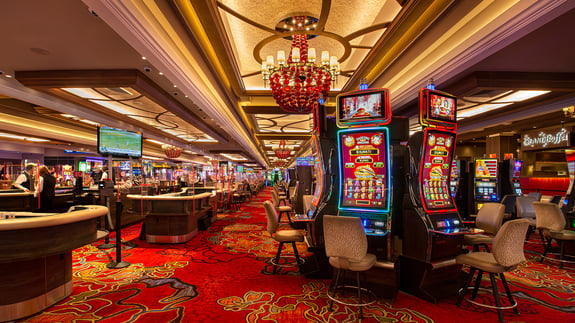
Casino games have long been a engaging entertainment option, drawing numerous of players from varied cultures around the globe. From the lively casinos of the Strip to the thriving gambling halls of the Chinese gambling capital, these games serve as a common thread that connects people across a variety of backgrounds. The allure of fortune, skill, and uncertainty entices not only those seeking to win money but also those in search of a sense of community.
The significance of casino games extends significantly past the gaming floor. They often represent the cultural standards and beliefs of the cultures in which they thrive. Games such as Texas hold ’em, 21, and the wheel game have woven themselves into the fabric of popular culture, influencing various aspects from cinema to clothing. As we explore this captivating intersection of chance and life, we can better understand how casino games shape and are shaped by the environment surrounding us.
Chronological Evolution of Gambling Games
The beginnings of casino games can be traced back to old civilizations, where gambling in various forms was extensively engaged in. In Ancient China, around two thousand three hundred years before Christ, a type of luck game known as Keno was common, while in historic the Roman Empire, soldiers would often gamble on the outcomes of their games. The concept of using chance for fun and gain evolved over the centuries, leading to the formation of more organized games. By the final Middle Ages, betting houses began to emerge in European nations, particularly in the Italian peninsula, which presented early versions of famous games still enjoyed today.
As betting gained popularity in European regions, the 17th and 18th centuries saw the emergence of gambling establishments as specialized establishments for betting. ไฮโลออนไลน์ The first official gambling house, the Ridotto, was founded in the city of Venice in sixteen thirty-eight, providing activities like the game of Baccarat and Faro games. This time marked a significant shifting point, as casinos commenced to attract not just the elite but also the growing middle-tier society. The sophistication of activities grew, leading to the development of new rules and variations that improved the experience of players.
In the 19th century, the industrial revolution and changes in social conventions also changed the landscape of gambling games. The introduction of roulette and contemporary gaming machines drew a larger clientele, and casinos became seen as legitimate forms of fun. This period witnessed the worldwide proliferation of casino activities, as casinos expanded from Europe to the Western Hemisphere, culminating in the creation of the legendary Las Vegas Boulevard in the 1900s. The development of casino games has progressed into the current era, including technology and online platforms, making them available to a worldwide population.
### Cultural Importance across Different Societies
Gambling games have deep-rooted cultural and social value across many societies across the world. Places like Las Vegas, the very core of the urban landscape is woven around gaming venues, where gambling is not just a hobby but a central aspect of leisure and community life. The bright lights and dynamic atmosphere attract millions, showcasing how gambling activities can shape local economical structures and local cultures. This environment transforms the notion of leisure into an immersive experience that affects fashion, sound, and even film.
Conversely, some cultures view gambling with greater care, seeing it through the lens of ethical considerations and heritage. For instance, in numerous Eastern cultures, games like Mahjong and Pai Gow Poker are full of history and carry significant social meanings. These games are often played during get-togethers and festivities, fostering community bonds and reinforcing familial ties. The act of playing these games goes beyond mere entertainment, reflecting ethics such as deference to seniors and the significance of shared enjoyment.
Simultaneously, in Western countries such as the principality of Monaco and the Italian Peninsula, casino games serve as symbols of luxury and sophistication. The elegant atmosphere of these locations attracts both travelers and native inhabitants, maintaining a sense of status and rarity. The art of Texas Hold’em and the tactical components of games like the game of baccarat are celebrated, molding community relationships and cultivating an allure that enthralls a heterogeneous audience. This underscores how casino games can concurrently mirror and influence cultural attitudes towards danger, reward, and community interaction.
Economic Impact and Travel Industry
Casino games play a important role in the economic landscape of many areas, particularly those that depend significantly on tourism. The revenue produced from casino operations fuels local financial systems, creating employment opportunities not only within the casinos but also but also in connected industries such as hospitality, dining, and entertainment. This surge of tourists, drawn by the attraction of games and the overall gaming environment, stimulates expenditure across multiple businesses, contributing to the economic health of the area.
The presence of casinos often leads to the development of infrastructure, including lodging, transportation systems, and leisure amenities. These developments are essential in improving the overall tourist experience, making locations more appealing to tourists. Additionally, many casinos contribute in local communities through sponsorship of activities and philanthropic initiatives, further integrating themselves into the community structure of the locality. Such investment not only supports economic growth but also fosters a positive image of the casino industry.
In addition, the global popularity of casino games drives competitive tourism, with regions vying to attract gamblers from across the globe. Iconic locations like Las Vegas and Macau have become synonymous with gambling culture, drawing millions each year. This advantage encourages creativity and variety within the gaming industry, influencing trends in entertainment and accommodation that extend beyond their borders. The ripple effects of this tourism extend wide, impacting local financial health and cultural exchanges on a worldwide scale.

